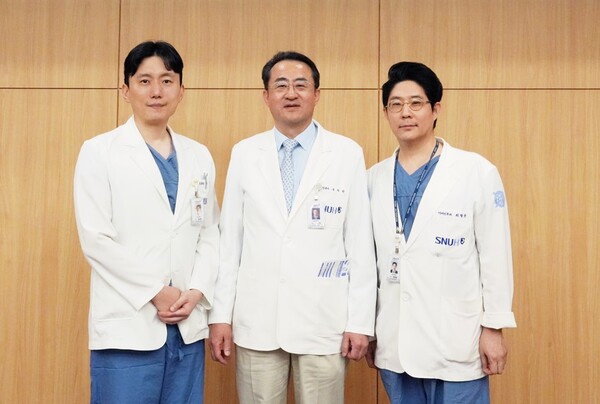Seoul National University Bundang Hospital’s Dizziness Center, led by Professors Koo Ja-won, Choi Byung-yoon, and Song Jae-jin from the Department of Otorhinolaryngology, has reached a major milestone by performing its 2,000th cochlear implant surgery. Professor Koo is the director of the center.

The hospital first launched its cochlear implant program by establishing its Dizziness Center in 2005. Since then, the center has demonstrated rapid growth, surpassing 500 cumulative cases in 2019, 1,000 cases in 2021, and 1,500 in 2023.
In March this year, the center crossed the 2,000-case mark—performing more than 500 surgeries every two years, a significant achievement that highlights its leadership in the field.
A cochlear implant is a surgical procedure designed for patients with profound hearing loss. Unlike hearing aids, which amplify external sound, cochlear implants deliver electrical signals directly to the auditory nerve via electrodes inserted into the cochlea.
This allows patients to perceive sound even when cochlear function is severely impaired, making it an important option for individuals with congenital hearing loss or those who no longer benefit from hearing aids.
The recent achievement underscores the center’s high level of clinical expertise and accumulated surgical know-how.
The SNUBH's medical team has led advancements in personalized cochlear implant treatment, incorporating preoperative EEG, imaging, and genetic testing to offer precision medicine tailored to each patient.
A multidisciplinary approach involving various departments ensures thorough preoperative evaluations, while a structured post-surgical care system—including speech therapy, hearing assessments, and rehabilitation—supports optimal outcomes.
Professor Choi has also spearheaded the center's research and development strategy in hearing loss and cochlear implant techniques. These efforts have played a key role in the program’s rapid growth.
The center has introduced hybrid cochlear implant surgery that preserves residual hearing in children with high-frequency hearing loss. The team also applies molecular genetic diagnostics to predict postoperative outcomes, enabling a precision medicine-based surgical approach. In addition, the center has adopted the pull-back technique, which repositions electrodes to enhance auditory nerve access, and has established early mapping protocols to accelerate patient adaptation after surgery.
“The number of surgeries is important, but improving the quality and success rate of each operation is what truly matters,” Professor Koo said. “Enhancing patient understanding through thorough counseling, realistic goal-setting for hearing recovery, and consistent post-operative rehabilitation such as speech therapy are all crucial factors that drive patient satisfaction.”
Related articles
- SNUBH, certified as 'research-centered hospital,' aims to lead healthcare R&D innovation
- Professor Huh of SNUBH appointed president of Korean Society for Dermatologic Surgery
- SNUBH’s AI breakthrough promises new hope for infertility treatments
- SNUBH rises to 68th in Newsweek’s 2025 Global Hospital Rankings, strengthening global reputation
- Korean Otological Society calls for expanded insurance coverage for cochlear implants to prevent dementia
- AI detects stress from voice alone in new SNUBH study
- Transformer AI model detects wheezing in chidren with over 90% accuracy: study
- Professor Moon’s maternal-fetal health research picked for long-term state funding
- Korean researchers validate gene therapy potential for common hereditary hearing loss mutation
- SNUBH becomes 1st state-run hospital in Korea to perform 20,000 robotic surgeries
- SNUBH researchers identify genetic factors influencing severity of rare PAX2-related kidney and eye disease
- Researchers identify gene expression changes linked to Alzheimer’s
- Big Ocean can’t hear their music -- but the world is listening

